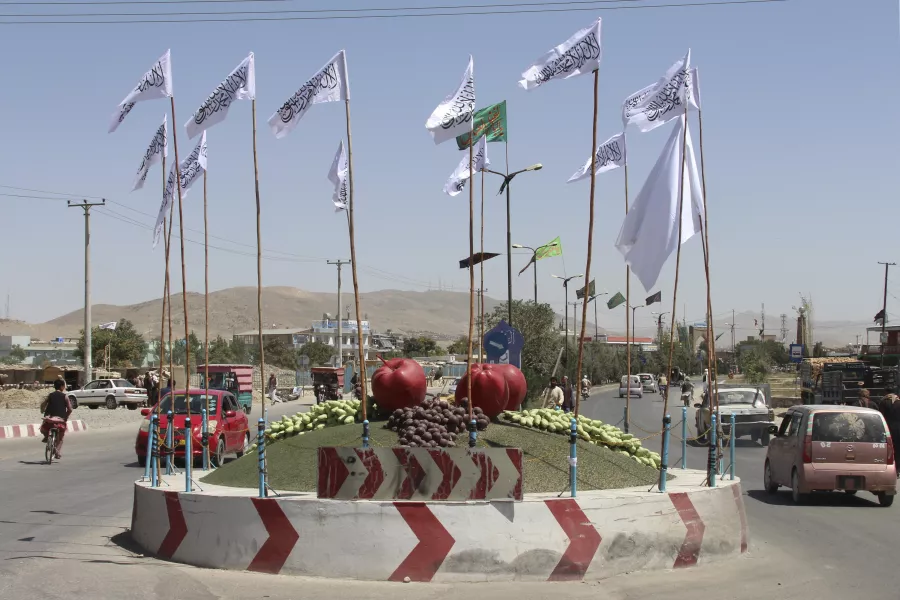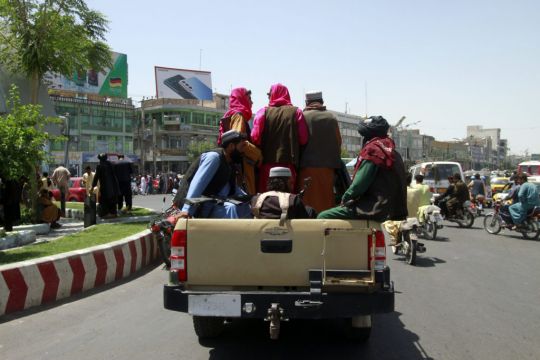Mazar-e-Sharif, the fourth-largest city in Afghanistan, fell to the Taliban on Saturday after a multipronged assault launched by insurgents, according to a lawmaker.
Balkh lawmaker Abas Ebrahimzada said the province’s national army corps surrendered first, which prompted the pro-government militias and other forces to lose morale and give up in the face of the onslaught.
According to the lawmaker, all of the provincial installations, including the governor’s office, are in Taliban hands.
The insurgents have captured much of northern, western and southern Afghanistan in a breakneck offensive less than three weeks before the US is set to withdraw its last troops, raising fears of a full militant takeover or another Afghan civil war.

The Taliban have made major advances in recent days, including capturing Herat and Kandahar, the country’s second- and third-largest cities.
They now control about 24 of Afghanistan’s 34 provinces, leaving the Western-backed government with a smattering of provinces in the centre and east, as well as Kabul.
On Saturday, the Taliban captured all of Logar province, just south of the capital, Kabul, and detained local officials, said Hoda Ahmadi, a lawmaker from the province.
Later, the insurgents took over Mihterlam, the capital of Laghman province, northeast of Kabul, without a fight, according to Zefon Safi, a lawmaker from the province.
Insurgents also captured the capital of Paktika, bordering Pakistan, according to Khalid Asad, a lawmaker from the province.
The small province of Kunar, also bordering Pakistan, fell without a fight, according to Neamatullah Karyab, a lawmaker from the area.

The Taliban also took control of Maimana, the capital of northern Faryab province, said Fawzia Raoufi, a lawmaker from the province.
Sayed Hussan Gerdezi, a lawmaker from the neighbouring Paktia province, said the Taliban seized most of its local capital, Gardez, but that battles with government forces were still under way. The Taliban said they controlled the city.
The Taliban also took control of the central province of Daykundi, lawmakers from those areas said.
Afghan President Ashraf Ghani delivered a televised speech Saturday, his first public appearance since the recent Taliban gains.
He vowed not to give up the “achievements” of the 20 years since the US toppled the Taliban after the 9/11 attacks.
The US has continued holding peace talks between the government and the Taliban in Qatar this week, and the international community has warned that a Taliban government brought about by force would be shunned.
But the insurgents appear to have little interest in making concessions as they rack up victories on the battlefield.
“We have started consultations, inside the government with elders and political leaders, representatives of different levels of the community as well as our international allies,” Mr Ghani said.

“Soon the results will be shared with you,” he added, without elaborating further.
The president had flown to Mazar-e-Sharif on Wednesday to rally the city’s defences, meeting several militia commanders, including Abdul Rashid Dostum and Ata Mohammad Noor, who command thousands of fighters.
They remain allied with the government, but during previous rounds of fighting in Afghanistan, warlords have been known to switch sides for their own survival.
Ismail Khan, a powerful former warlord who had tried to defend Herat, was captured by the Taliban when the insurgents seized the western city after two weeks of heavy fighting.
Tens of thousands of Afghans have fled their homes, with many fearing a return to the Taliban’s oppressive rule.
The group had previously governed Afghanistan under a harsh version of Islamic law in which women were forbidden to work or attend school, and could not leave their homes without a male relative accompanying them.
Salima Mazari, one of the few female district governors in the country, said she has never even considered surrendering.

“There will be no place for women,” said Ms Mazari, who governs a district of 36,000 people near Mazar-e-Sharif.
“In the provinces controlled by the Taliban, no women exist there any more, not even in the cities. They are all imprisoned in their homes.”
The withdrawal of foreign troops and the swift collapse of Afghanistan’s own forces – despite hundreds of billions of dollars in US aid over the years – has raised fears the Taliban could return to power or that the country could be shattered by factional fighting, as it was after the Soviet withdrawal in 1989.
It has also prompted many American and Afghan veterans of the conflict to question whether two decades of blood and treasure was worth it.
Afghans have been streaming into Kabul’s international airport in recent days, desperate to fly out, even as more American troops have arrived to help partially evacuate the US embassy.
The Taliban also released a video announcing the takeover of the main radio station in the southern city of Kandahar, which fell to the insurgents earlier this week, renaming it the Voice of Sharia, or Islamic law.
In the video, an unnamed insurgent said all employees were present and would broadcast news, political analysis and recitations of the Koran, the Islamic holy book.
It appears the station will no longer play music. It was not clear if the Taliban had purged the previous employees or allowed them to return to work.







